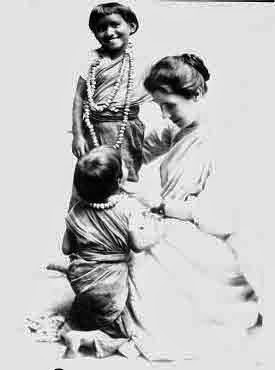***We believe that one of the lessons the Lord is teaching us is to trust Him even when He doesn’t answer our request in the way we desire.
This month just so happens to mark the anniversary of a profound event in the life of a missionary who is not well-known in many urban communities in America. In his blog on Church History, Dennis Alan Ray presents the story
of a missionary named Amy Carmichael:
When Amy Carmichael was a child in Ireland, her mother told her that if Amy were to pray then God would answer. Amy had dark hair and brown eyes. Since she didn’t like her brown eyes she prayed for God to give her blue ones. The next morning Amy wailed in disappointment. It was a while before Amy would understand that "no" was an answer, too.
Even though the “no” answer disappointed her, she never lost her faith in God. Service to Him became the passion of her life, leading Amy to start classes and prayer groups for Belfast’s many poor and homeless children. Her Sunday classes were also attended by factory girls who were so poor that they could not afford hats to wear to church and wore shawls instead. Unfortunately, most “respectable church people” refused to have anything to do with them.
In the years following her father’s death, the Carmichaels found themselves in tough financial circumstances. Amy's mother decided to move to England and work for Uncle Jacob. Amy and another sister joined her. Uncle Jacob asked Amy to teach his mill workers about Christ and she threw herself into the work, living near the mill in an apartment infested with cockroaches and bed bugs. Amy was constantly sick with neuralgia and had to lie in bed for days at a time. Her bad health eventually forced her to give up that ministry for the mill workers.
When she announced she was going to be a missionary, her friends thought she was being foolish and predicted that she would soon be back in England. Nevertheless, in 1892, she answered the call to the mission field and made her way to India.
In Dohnavur, India, Amy Carmichael was mightily used of God in what we, at Urban Life, call STEALTH MINISTRY.
According to local custom, young girls were often abandoned and left on the temple steps to be dedicated to the Hindu gods. They were forced into prostitution to earn money for the priests. Amy heard about a five-year-old girl named Kohila who faced just such a fate. Dressed in a sari, her skin stained brown, with her dark hair, and because of her brown eyes, Amy could pass as a Hindu. Disguised in this way she rescued the little girl and gave her shelter.
Now she understood why God had given her brown eyes. Blue eyes would have been a dead giveaway!
When the child’s guardians discovered what had happen, they demanded the child’s return. Amy refused to return the little girl to a life of certain abuse and arranged for Kohila to "disappear" to a safe place. Technically that made Amy a kidnapper.
Over the years, the brown-eyed, dark haired Amy would rescue many other children, often at the cost of extreme exhaustion (due to her illness) and personal danger.
Eventually, charges were brought against Amy. She faced a seven year prison term. However, she did not go to prison. A telegram arrived on February 7, 1914, saying, "Criminal case dismissed." No explanation was ever given, but those who worship Amy's Lord have no doubt that He had a hand in the decision.
Amy would continue her mission for the next fifty years until her death in 1951. Her mission and ministry is still operating today. Her first under-cover mission, to rescue little Kohila from the temple, happened on March 9, 1901
— 113 years ago this month.
Through the lives of countless Believers and Christians like Amy Carmichael, we have seen faithfulness and perseverance that puts many American Christians to shame. These are the kind of stories I grew up hearing as a child. This is the legacy that has been passed down to us. This is the way we are to see the Urban Life ministry in this community. We must have hearts, like Amy Carmichael, to rescue families, even at the risk of our own lives.
Now it’s our turn to serve God in our generation. Now it’s our turn to say ‘yes’ to God, even when His answer to our personal request is ‘no’. We must trust that He knows where He is leading us and trust that He is working His plan and purpose through our hearts and homes.

